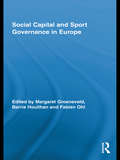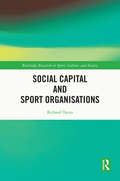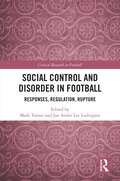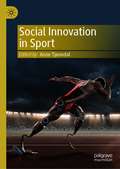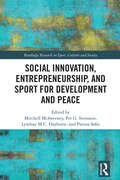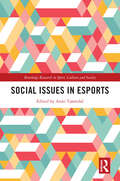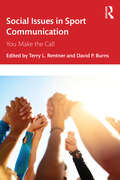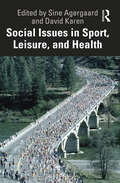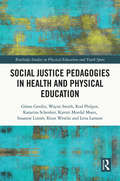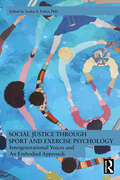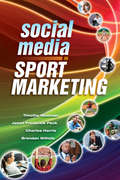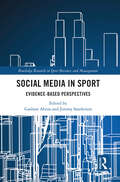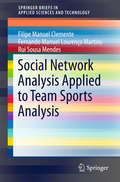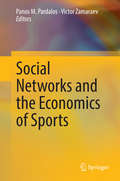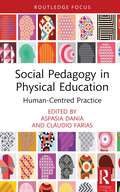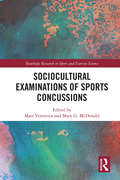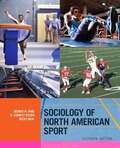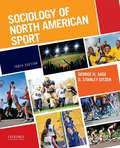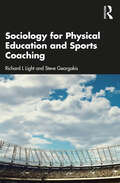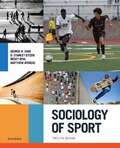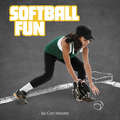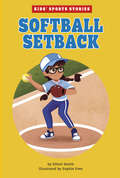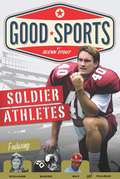- Table View
- List View
Social Capital and Sport Governance in Europe (Routledge Research in Sport, Culture and Society)
by Margaret GroeneveldAlthough there is significant interest in the social role of sport in fostering civil society from both policymakers and academics, there is a lack of evidence of the specific role of sport federations in this system. This book critically presents the mechanisms and structures in a selection of sport federations within a variety of European countries that illuminate the varied relationships between not-for-profit sport federations, their members, governments and the citizens they represent. The contributors explore the contrasts and synergies between core social capital theoretical perspectives, and how these may be informed by and/or shape the realities of governance from different perspectives within the sport system.
Social Capital and Sport Organisations (Routledge Research in Sport, Culture and Society)
by Richard TaconDrawing on primary research within voluntary sports clubs in the UK and secondary analysis of the wider international literature on social capital, this text focuses on the micro-processes of social capital development and how they play out in specific social settings. In so doing, it adds to existing research by developing a rich, contextualised, process-based view of social capital in action. Critically reviewing theoretical and empirical literature on social capital, the book highlights the key current debates. The empirical core of the book draws on ethnographic observation over 18 months at voluntary sports clubs in the UK, including in-depth interviews with sports club members and organisers. The text explicitly seeks to set this empirical work in its wider context, by considering the findings in relation to other international studies of social capital in both sports clubs and other types of organisation. The book draws on international research from a whole range of countries: UK, USA, Australia, Canada, Norway, Denmark, Netherlands, Japan, Vanuatu, Czech Republic, Germany, and many others. The book establishes a transferable, process-based understanding of how social capital develops – both within sports clubs and beyond. This is an illuminating reading for policymakers, practitioners, and researchers with an interest in the sociology of sport, sport development, sport management, sport policy, social theory, social policy, or social networks.
Social Control and Disorder in Football: Responses, Regulation, Rupture (Critical Research in Football)
by Mark Turner Jan Andre Lee LudvigsenThis is the first book to focus on the interrelated issues of social control and disorder in football. It shows how the ‘beautiful game’ illuminates our understanding of the mechanisms and techniques of social control and regulation in contemporary societies. It explores past, new, and continued responses from law enforcers, football associations, sport’s governing bodies, the media, and international organizations to issues of disorder and misbehaviour in football, and how this is highly contested by fans and fan groups. Featuring the work of an international team of leading researchers in football and sport-related studies, the book examines key contemporary trends and topics including fan activism, football-specific legislation, power, violence, fan rivalries, subcultures, the policing of crowds, social sorting, and surveillance. Featuring diverse international cases, including the Qatar World Cup, stadium protests in Portland, Oregon, spectator violence in Polish football, social media and Brazilian football, and sectarianism in Scottish football, the book also looks ahead to what the future holds for the world’s most popular sport. This is an invaluable resource for students, researchers, or the general reader with an interest in the sociology of sport, criminology, sport management, and sports law.
Social Innovation in Sport
by Anne TjønndalThis book provides fresh insights on how social innovations are utilized as strategies to make sport more accessible and inclusive. It does so by bringing together theoretical insights and empirical studies from Norway, Sweden, Denmark, the United States, Australia, Turkey and Belgium. Within the overarching topic of social innovation in sport, this book covers contemporary themes such as digitalization, urban planning, gender equality and innovation in sport policy and practice. It will be of interest to researchers and students in the fields of sociology of sport, sport management, sport science and sociology.
Social Innovation, Entrepreneurship, and Sport for Development and Peace (Routledge Research in Sport, Culture and Society)
by Parissa Safai Mitchell McSweeney Per G. Svensson Lyndsay M.C. HayhurstThis book examines the ways in which sport for development and peace (SDP) offers an opportunity for entrepreneurship to take place through and within sport, and how innovation in the context of SDP contributes to social and economic value for underrepresented and marginalised groups and individuals. Written by a team of leading international SDP researchers, and featuring the voices of active SDP practitioners, the book examines the ways in which entrepreneurs seek to use sport and/or social innovation in and through sport to achieve their goals of social and economic development. It explores the strategies that SDP organizations and practitioners are utilizing in the current neoliberal moment to not only survive during economic hardship - particularly during the COVID 19 crisis - but also to thrive, drawing on important concepts such as innovation, risk taking, proactiveness and opportunity seeking. It also considers how nongovernmental organizations, companies, governments, and communities are working to tackle development issues in SDP using non-traditional forms of organization and management, such as social enterprise models. Combining cutting-edge research with reflections on best practice in the field, this book is important reading for any advanced student, researcher or practitioner with an interest in the sociology of sport, sport for development, sport management, development studies, social enterprise or innovation.
Social Issues in Esports (Routledge Research in Sport, Culture and Society)
by Anne TjønndalThis book provides important new insights into social issues in the rapidly growing field of esports, filling a gap in the literature that has, until now, been dominated by business and management perspectives. Bringing together leading esports experts from Europe, North America and Australia, the book provides new sociological analyses that define and locate esports in social studies. It explores key issues in esports, and in the wider sociology of sport, including gender equity, diversity, cheating and doping, physical and mental health, and issues related to the governance of esports. Presenting new empirical research alongside critical, theoretical perspectives, the book addresses themes such as digitalisation, technology, equality, innovation and welfare, suggesting directions for future research and highlighting implications for practice and development in the esports industry. This is essential reading for advanced students, researchers and practitioners working in esports, the sociology of sport, gaming studies, media studies, sociology, or the interaction of ICT and wider society.
Social Issues in Sport Communication: You Make the Call
by Terry L. Rentner David P. BurnsCombining theory with practical application, this collection of real-life, provocative case studies on social issues in sports provides students with the opportunity to make the call on ethical and professional dilemmas faced by a variety of sport and communication professionals. The case studies examine the successes and failures of communication in the corporate culture of sport intersecting with social issues including race, gender, religion, social media, mass media, public health, and LGBTQ+ issues. Topics include the COVID-19 pandemic, the Black Lives Matter movement, sexual abuse scandals, domestic violence, cultural appropriation, and mental health. Each chapter contextualizes a specific issue, presents relevant theory and practical communication principles, and leads into discussion questions to prompt critical reflection. The book encourages students to view the evidence themselves, consider competing ethical and professional claims, and formulate practical responses. This collection serves as a scholarly text for courses in sport communication, business, intercultural communication, public relations, journalism, media studies, and sport management.
Social Issues in Sport, Leisure, and Health
by David Karen Sine AgergaardThis book examines how social issues shape and influence our engagement with sport, leisure time physical activity, and health-promoting exercise. Connecting the personal with the public, it helps the reader understand how individual exercise, leisure, and sport participation are both facilitated and constrained by their social contexts. Presenting a series of in-depth descriptions of grassroots sport, urban lifestyle sport, physical activity across the life course, sport for children with special needs, and the development of creative climates in sport, this book seeks to encourage what C. Wright Mills described as the “sociological imagination”. Every chapter begins with an individual-level account centred on everyday challenges with accessing sport, partaking in leisure activities, and meeting guidelines for daily exercise before exploring the larger, socially determined patterns in which those experiences are located, establishing a vital template for the social scientific study of sport, leisure, and health. Touching on key contemporary themes including diversity, inclusion, health inequalities, and physical inactivity, as well as selection and intensification in sports, this book offers new case material and theoretical tools for understanding the relationships between sport, leisure, health, and the wider society. This is an indispensable companion for any course on the sociology of sport, exercise, leisure, or physical activity and health.
Social Justice Pedagogies in Health and Physical Education (Routledge Studies in Physical Education and Youth Sport)
by Katarina Schenker Göran Gerdin Wayne Smith Rod Philpot Kjersti Mordal Moen Susanne Linnér Knut Westlie Lena LarssonThis book makes the case that school Health and Physical Education (HPE) can make a unique contribution to young people’s physical, emotional and social health outcomes when teachers of HPE engage in pedagogies for social justice that emphasise inclusion, democracy and equity. Drawing on observations and teacher interviews across Sweden, Norway and New Zealand, the book explores successful school teaching practices that promote social justice and equitable health outcomes. In particular, it draws attention to the importance of building relationships, teaching for social cohesion and explicitly teaching about and acting on social inequities as pedagogies for social justice. The book also argues that context matters and that pedagogies for social justice need to recognise how both approaches to, and focus on, social justice vary in different contexts. This is essential reading for academics and students interested in social justice and working in the fields of education, HPE and teacher education.
Social Justice through Sport and Exercise Psychology: Intergenerational Voices and An Embodied Approach
by Leslee A. FisherSocial Justice Through Sport and Exercise Psychology: Intergenerational Voices and An Embodied Approach provides a narration of the history of social justice work in sport and exercise psychology as advanced through the voices of those leaders who have dared to imagine a more just and equitable sporting world. By situating their history through critical genealogy, within an analysis of the larger social relationships of power in both the competitive sporting context and the field of sport and exercise psychology (including patriarchy, sexism, racism, classism, ableism, and homonegativity), an effort is made to illuminate their political lineages and how these individuals utilized social justice theories and critical reflexivity in their work. The fourfold purpose of this brand new and cutting-edge volume is to (1) frame the critical genealogy and political lineages of leaders in the field of sport and exercise psychology, who have promoted social justice in their work; (2) provide an autobiographical sketch for each of the authors that chronicles the ways their life experiences and trajectories have influenced their respective philosophies of social justice; (3) flesh out how those philosophies are evidenced, both implicitly and explicitly, in their work; and (4) illustrate how a social justice framework has informed their respective consulting philosophies.Social Justice Through Sport and Exercise Psychology: Intergenerational Voices and An Embodied Approach is key reading not only for scholars, students, and practitioners in the field of sport and exercise psychology but also for those in the subdisciplines of sport sociology, athletic training, and strength and conditioning, as well as licensed professional counsellors, licensed clinical social workers, and certified athletic trainers.
Social Media in Sport Marketing
by Brendan Wilhide Jason Peck Timothy NewmanFrom the Preface: "Not surprisingly, companies of all sizes are using social media as part of their marketing and public relations efforts. The growth of the social media phenomenon and constant advances in technology obviously create unique and powerful opportunities for those able to capitalize on them. The question is how best to do so? Social Media in Sport Marketing has been created to help answer this question as it pertains to sport organizations."Written from the perspective of sport professionals, this brief but thorough text explores the concepts, tools, and issues surrounding social media and marketing, with reader-friendly examples and applications specifically from the world of sports. The authors connect industry-specific content with current trends in social media and provide readers with a balance between theory and experience. Instructors and students can use the book as a primary resource for teaching and learning about traditional sport marketing/public relations principles as they relate to social media. Instructors will appreciate the inclusion of case studies, which can be used to generate discussions; students will benefit from the numerous examples. The book can also serve as a guidebook for those who want to put ideas into action immediately. The experienced author team includes a sport marketing professor as well as practitioners involved in social media project management and development.
Social Media in Sport: Evidence-Based Perspectives (Routledge Research in Sport Business and Management)
by Gashaw Abeza and Jimmy SandersonThis book takes a close look at social media in sport and considers its significance for sport business and for the wider relationship between sport and society. Presenting new research, case studies and data, it examines the way people use social media, the changing art of managing social media platforms, and the theory and concepts that inform research on this important topic. Featuring the work of leading sport researchers from around the world, the book presents evidence-based analysis of contemporary topics including fan engagement, athlete activism, branding and sponsorship strategies, sportswashing, public relations and crisis communication. It presents case studies from sports and events such as the Olympic Games, the WNBA, professional football leagues, and Peloton, and across social media platforms including TikTok, Twitter and Instagram. This is essential reading for anybody with an interest in sport media, sport business, the sociology of sport, digital business, or new media studies.
Social Network Analysis Applied to Team Sports Analysis
by Filipe Manuel Clemente Fernando Manuel Louren o Martins Rui Sousa MendesExplaining how graph theory and social network analysis can be applied to team sports analysis, This book presents useful approaches, models and methods that can be used to characterise the overall properties of team networks and identify the prominence of each team player. Exploring the different possible network metrics that can be utilised in sports analysis, their possible applications and variances from situation to situation, the respective chapters present an array of illustrative case studies. Identifying the general concepts of social network analysis and network centrality metrics, readers are shown how to generate a methodological protocol for data collection. As such, the book provides a valuable resource for students of the sport sciences, sports engineering, applied computation and the social sciences.
Social Networks and the Economics of Sports
by Panos M. Pardalos Victor ZamaraevThis book presents recent research developments in social networks, economics, management, marketing and optimization applied to sports. The volume will be of interest to students, researchers, managers from sports, policy makers and as well athletes. In particular the book contains research papers and reviews addressing the following issues: social network tools for player selection, movement and pricing in team sports, methods for ranking teams and evaluating players' performance, economics and marketing issues related to sports clubs, techniques for predicting outcomes of sports competitions, optimal strategies in sports, scheduling and managing sports tournaments, optimal referee assignment techniques and the economics and marketing of sports entertainment.
Social Pedagogy in Physical Education: Human-Centred Practice (Routledge Focus on Sport Pedagogy)
by Cláudio Farias Aspasia DaniaThis is the first book to examine social pedagogy within the context of physical education, enabling more inclusive, and meaningful educational experiences for all students. It introduces the key concepts of social pedagogy and outlines practical strategies for implementing social pedagogy in physical education.Written by a team of leading international scholars and practitioners, this book assesses the research base for social pedagogy and explores how social pedagogy can be embedded in the physical education curriculum, in teaching and in assessment. Every chapter includes vignettes from both school and after‑school contexts and features a practitioner voice, from a teacher or a community member. This book also looks at social pedagogy in the context of key themes across physical education, from digital assessment methods and systems thinking, to models‑based approaches and physical education teacher education. As the chapters of this book unfold, the reader gets to know how to apply social pedagogy as a framework for physical education, choose strategies to enable human‑centred practice, and use assessment to align the curriculum with social pedagogy principles.This book makes a major contribution to our understanding of teaching and learning within physical education as processes of interacting for a good life though communication, connection, contribution, and creation. Concise, practical, and full of real‑world examples, this is essential reading for any student, pre‑service and in‑service physical education teacher, or coach working with children or young people across various educational levels and country contexts.
Sociocultural Examinations of Sports Concussions (Routledge Research in Sport and Exercise Science)
by Matt Ventresca Mary G. McDonaldSport’s "concussion crisis" has been characterized by controversial scientific discoveries, athlete suicides, and high-profile lawsuits involving professional sports leagues, while provoking widespread media coverage, changes to game rules, and debate about the future of many popular sports. Sociocultural Examinations of Sports Concussion is the first edited collection to bring together multiple sociocultural perspectives on sports concussion that interrogate the social, economic, political, and historical forces shaping the cultural impacts of these injuries. Each of the ten chapters moves beyond biomedical or neuroscientific paradigms to critically examine a specific intersection of sociocultural factors influencing public perceptions about concussion or athlete experiences of brain injury. These include analyses of media and advertising, medical treatment and diagnostic protocols, gender and masculinity, developments in equipment and scientific models, economics and labor politics, understandings of trauma and recovery, public health philosophies, and disciplinary differences in framing the ontologies of concussion. Drawing from a wide range of theoretical and methodological approaches, Sociocultural Examinations of Sports Concussion offers a diverse set of analyses examining brain injuries as cultural and embodied phenomena affecting more than just athletes’ brains, but also embedded within and (re)shaping meanings, identities, and social contexts. It is valuable reading for graduate students and researchers interested in the experience and treatment of sports concussion, sports sociology, and sports technology.
Sociology Of North American Sport
by D. Stanley Eitzen George H. Sage Becky BealNow in its eleventh edition, Sociology of North American Sport offers a compact yet comprehensive and integrated perspective on sport in North American society. Bringing a unique viewpoint to the subject, George H. Sage, D. Stanley Eitzen, and Becky Beal analyze and, in turn, demythologize sport. This method promotes an understanding of how a sociological perspective differs from commonsense perceptions about sport and society, helping students to understand sport in a new way.
Sociology Of North American Sport
by D. Eitzen George SageNow in its tenth edition, Sociology of North American Sport offers a compact yet comprehensive and integrated perspective on sport in North American society. <P><P>Bringing a unique viewpoint to the subject, George H. Sage and D. Stanley Eitzen analyze and, in turn, demythologize sport. This method promotes an understanding of how a sociological perspective differs from common-sense perceptions about sport and society, helping students to understand sport in a new way.
Sociology for Physical Education and Sports Coaching
by Richard L Light Steve GeorgakisThis book introduces the fundamentals of sport sociology and social issues in sport for students of physical education (PE) and coaching. It provides an accessible, jargon-free foundation for understanding the relationships between sport, education, and wider society that puts into context the reader's applied studies in PE and coaching. Drawing on cutting-edge research, this book examines core topics in the study of sport and society, including the origins of sport, sport education, sport as business, commodification, globalisation, sport and health, sport and the media, gender, migration, and Indigenous people in sport. Throughout this book, in-depth ‘commentary’ pieces look closely at particular pieces of research that illustrate the sociological themes being examined, from the impact of sport media on school children to the effects of hegemonic masculinity in rugby. This book is invaluable reading for any course on sport and society, physical education, sports coaching, or sport development.
Sociology of North American Sport
by Stanley EitzenExploration of North American sporting rituals through the lens of sociology.
Sociology of Sport
by D. Stanley Eitzen George H. Sage Matthew Atencio Becky BealThis engaging, comprehensive textbook for sociology of sport courses takes a critical approach, focusing in particular on issues of power and inequality. By addressing questions such as "Are sports free of racism and sexism?" and "Who pays for, and who benefits from, sports?", students understand sport from a sociological perspective rather than as simply a spectator or participant.
Sociology of Sports and Physical Activity
by George B. Cunningham John N. SingerThe primacy of sport and physical activity has resulted in the academic study of those endeavors, including the management of, psychological dynamics associated with, and sociological analysis of sport and physical activity. The focus of this book, is on the latter academic pursuit.
Softball Fun (Sports Fun)
by Cari MeisterSoftball is exciting to watch, but it’s even more fun to play! Kids can take the field by learning the rules of the sport, the equipment and skills needed to play, and the importance of good sportsmanship. A simple activity helps kids strengthen a basic softball skill.
Softball Setback (Kids' Sports Stories)
by Elliott SmithSisters Emilia and Natalia love playing softball together. Both are great pitchers. Emilia enjoys being the center of attention and loves being on the pitcher's mound. Natalia would rather be behind her catcher's mask and never pitch. Then Emilia hurts her ankle during a big game. Will Natalia be able to overcome her fear of being in the spotlight and step up to the mound?
Soldier Athletes
by Glenn StoutStories of bravery and self-sacrifice from well known athletes who have served in the military. -Ted Williams, Boston Red Sox outfielder, whose career was interrupted by service as a pilot during both World War II and Korea, where he saw combat and survived a crash landing. -Rocky Bleier, Pittsburgh Steelers running back: Drafted in 1968, nearly lost a foot on a land mine during Vietnam War. -Carlos May, Chicago White Sox outfielder, an emerging star whose fought to remain in the major leagues after a training accident during National Guard service caused him to lose his thumb. -Pat Tillman, Arizona Cardinals defensive back who turned down a multi-million dollar contract to join the military after 9/11and was later killed in Afghanistan.
